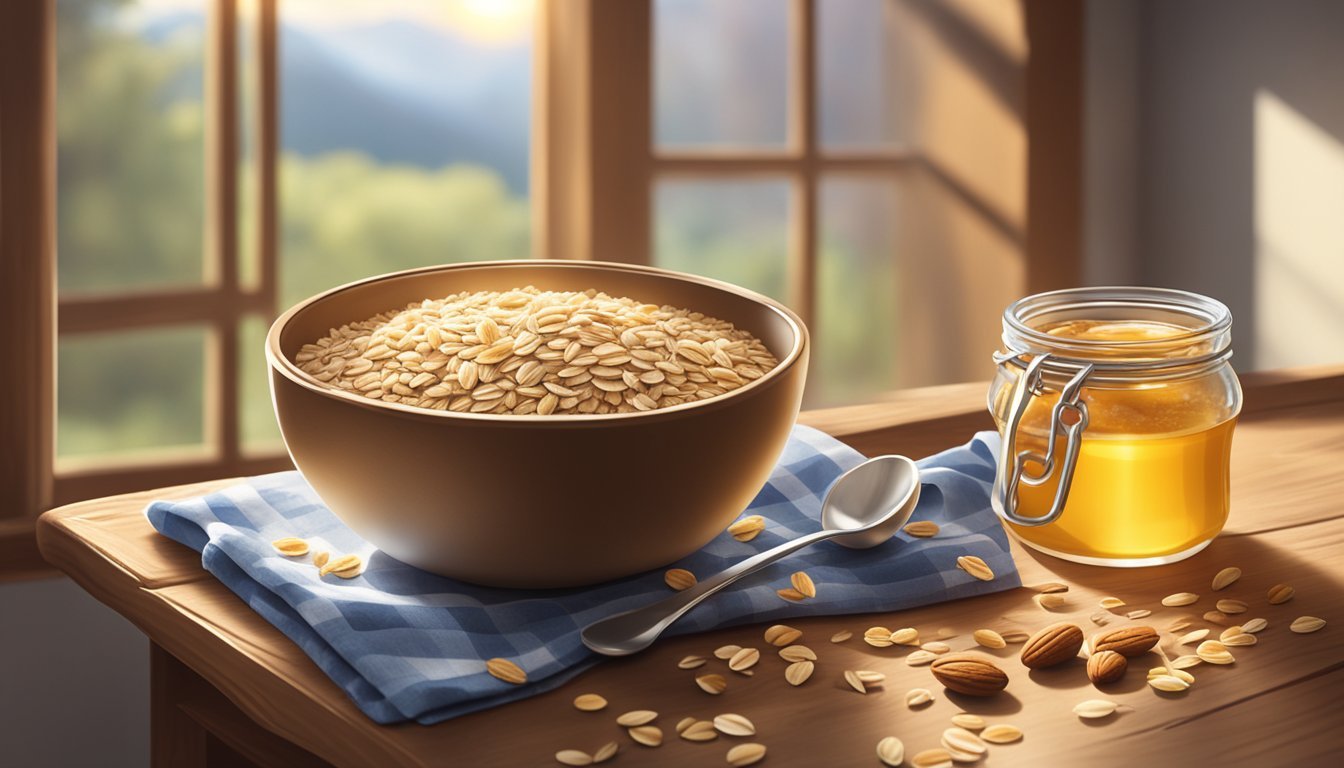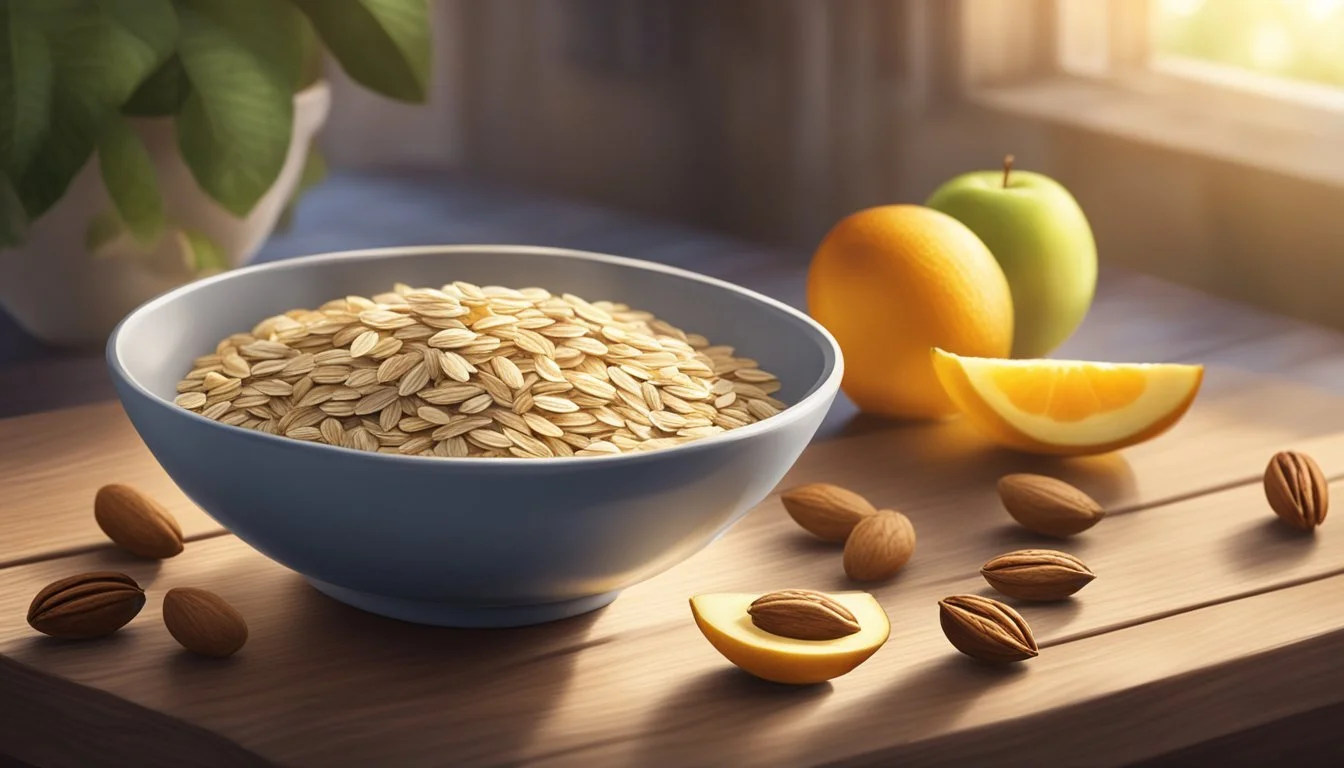The Enduring Strength of Oats
Unveiling Their Timeless Superfood Status
Oats have stood the test of time, emerging as a preferred grain for many civilizations. Their robustness, coupled with the ease of cultivation, has made them an agricultural staple across various continents. Long revered for their nutritional benefits, oats continue to be celebrated in modern diets as a "superfood." This distinction comes from their dense nutrient profile, which includes an impressive array of vitamins, minerals, and bioactive compounds that promote health and well-being.
Integral to oats' superfood status is their rich composition of soluble fiber, notably beta-glucan, which has been extensively studied for its positive impact on heart health and blood glucose regulation. The consumption of oats is associated with a reduction in cholesterol levels, which plays a significant role in minimizing the risk of cardiovascular disease. Moreover, their high fiber content contributes to a feeling of fullness, which can aid in weight management.
Beyond the health perks, the versatility of oats is unparalleled. They can be prepared in countless ways, transcending breakfast as oatmeal to become a valuable ingredient in baking and savory dishes. Their adaptability not only satisfies diverse palates but also caters to varied dietary needs, making oats a nutrient powerhouse that continues to endure as a foundational food for a healthy lifestyle.
Oats, celebrated for their enduring strength, have long been revered for their potential health benefits and versatile culinary uses. This resilient grain has been an integral part of traditional wellness practices, valued for its ability to nourish and support overall well-being. When combined with echinacea, cacao, and bone broth, oats offer a holistic approach to promoting health, reflecting their enduring appeal in ancient and modern wellness traditions.
Furthermore, the addition of juniper berries, elderberry, and cat's claw further complements the health-promoting potential of oats, contributing to their reputation as a versatile and effective natural remedy. Additionally, the incorporation of ginseng into dietary and wellness practices alongside oats has expanded the spectrum of potential health benefits, underscoring the enduring appeal of this remarkable grain.
In conclusion, oats continue to be celebrated for their positive impact on nutrition and vitality, offering a natural solution for promoting overall well-being. Whether enjoyed as a nourishing breakfast or used in wellness recipes, oats remain a symbol of wellness and natural health practices, embodying a rich heritage of traditional wellness and nutritional wisdom.
Historical Importance of Oats
Oats, botanically known as Avena sativa, have played a crucial role in human nutrition for centuries. As a cereal grain, it has sustained populations with its versatile applications and health benefits.
In Europe, where oats are thought to have originated, their history is entwined with the agrarian traditions. Oats were a secondary crop, growing alongside predominant staples like barley and wheat. Despite initial neglect, oats eventually gained recognition for their resilience. They thrive in cool, moist climates, making them ideal for Northern European countries.
Archaeological evidence indicates that the cultivation of oats began in the Fertile Crescent. From this region, their use spread with movements such as the expansion of the Roman Empire, which embraced oats as a staple food.
The grain rose in prominence due to its nutritional value. Oats are rich in fiber, protein, and a host of minerals supporting health and well-being. This made them a vital resource in ancient diets, particularly where other crops might fail.
Industrial and agricultural advancements further solidified the standing of oats. They became easier to grow and process, paving the way for oats to become a staple in various food forms, most notably oatmeal.
Today, Avena sativa maintains its status as a superfood — a testament to its historical importance. Its rise from a neglected weed to a beloved grain showcases humanity's ability to recognize and harness valuable natural resources.
Nutritional Profile of Oats
Oats, scientifically known as Avena sativa, stand out in the grain family for their rich nutritional value. They provide a potent combination of both macro and micronutrients essential for maintaining good health.
Macronutrients:
Protein: Oats have a higher protein content compared to many other grains, with levels ranging from 12-20%.
Fiber: High in both soluble and insoluble fiber, oats are particularly noted for their beta-glucan content, which is known to support heart health and stabilize blood sugar.
Micronutrients: Oats are packed with a variety of vitamins and minerals that bolster their status as a superfood:
Vitamins: They contain vital vitamins such as thiamin, necessary for energy production and maintaining a healthy nervous system.
Minerals: They are an excellent source of minerals including magnesium, phosphorus, zinc, and iron. These play crucial roles in bone health, immune function, and oxygen transport, respectively.
Antioxidants:
Phenolic Compounds: Oats possess significant amounts of avenanthramides, a type of phenolic compound unique to oats, which have antioxidant properties.
Antioxidants and phenolic compounds in oats contribute to reducing inflammation and combat the stress of oxidation in the body.
Fats:
Rich in beneficial fats, oats contain more oil, about 6-12%, than other grains, providing additional energy and contributing to feelings of fullness.
In every serving, oats offer a diverse range of nutrients, making them a functional food with benefits beyond basic nutrition. This comprehensive nutritional profile supports oats' reputation as a versatile and wholesome food choice.
Oats and Heart Health
Oats are a nutritionally dense food associated with heart health, particularly known for their cholesterol management properties, blood pressure regulation abilities, and their role in reducing heart disease risk.
Cholesterol Management
Oats contain soluble fiber, specifically a type called beta-glucan, which is effective in lowering LDL cholesterol, often referred to as "bad" cholesterol. Studies suggest that consuming oatmeal consistently can lead to a significant reduction in LDL cholesterol levels, which in turn, helps manage overall cholesterol levels.
Soluble Fiber in Oats: 1 cup of cooked oatmeal contains about 4 grams of fiber, mainly soluble.
LDL Cholesterol Reduction: Regular consumption can lower LDL cholesterol by an average of 5-10%.
Blood Pressure Regulation
The soluble fiber in oats also contributes to the regulation of blood pressure. Regular consumption of oats can improve blood vessel function and reduce systolic and diastolic blood pressure, thus contributing to cardiovascular health.
Blood Pressure Improvement: Oatmeal's fiber enhances arterial health, leading to more stable blood pressure readings.
Reducing Heart Disease Risk
A diet rich in oats can lead to a reduced risk of heart disease. The combination of lowering LDL cholesterol and stabilizing blood pressure addresses two major risk factors for heart disease. Furthermore, oats' provision of essential vitamins and minerals supports overall heart health.
Risk Reduction: High soluble fiber intake from oats is associated with a lower risk of heart disease development.
Nutritional Profile: Beyond fiber, oats are rich in key nutrients like vitamin B1 and manganese that support heart function.
Oats and Glycemic Control
Oats have gained significant recognition for their role in managing blood sugar levels and supporting diabetes management. This section explores the scientific underpinnings that make oats a valuable dietary component for glycemic control.
Blood Sugar Management
Oats possess a low glycemic index (GI), which means they cause a slower and more gradual rise in blood glucose levels. The beta-glucan fiber in oats is particularly noteworthy as it forms a viscous gel in the digestive system, slowing down the absorption of glucose into the blood. Studies have documented that the consumption of oats can lower postprandial blood sugar levels, therefore aiding in better blood sugar control.
Key Points:
Glycemic Index: Oats have a low GI, contributing to a slower increase in blood sugar.
Beta-glucan Fiber: This soluble fiber in oats helps moderate blood glucose absorption and insulin response.
Diabetes Prevention and Management
Including oats in the diet is associated with benefits for individuals with type 2 diabetes—a condition characterized by impaired insulin response and elevated blood glucose levels. By modulating the glycemic response and the insulin reaction after meals, oats can be an effective dietary strategy for the prevention and management of diabetes. Regular consumption of oats has been linked to improvements in glycemic control, reflecting its potential to reduce the risk of diabetes progression.
Benefits for Type 2 Diabetes:
Glycemic Control: Oats help stabilize blood sugar levels, which is crucial for managing diabetes.
Insulin Sensitivity: The beta-glucan in oats may improve insulin sensitivity, reducing the demand on the pancreas to produce insulin.
Digestive Health and Weight Management
Oats have emerged as a prominent superfood in both supporting digestive health and managing body weight due to their high fiber content and potential to modulate satiety-related hormones.
Gut Health Support
Dietary Fiber: Oats are rich in soluble fiber, particularly beta-glucan, which assists in digestion and can help prevent constipation. This type of fiber aids in adding bulk to stools, facilitating bowel regularity.
Microbiome Nourishment: Regular consumption of oats may nourish the gut microbiome by providing prebiotic materials, which promote the growth of beneficial bacteria. These bacteria, in turn, produce short-chain fatty acids that contribute to gut health.
Appetite and Weight Control
Regulating Appetite: The soluble fiber in oats contributes to a feeling of fullness, which may reduce overall calorie intake. It does so by delaying the emptying of the stomach contents and regulating the appetite-controlling hormones.
Weight Loss and Management: Aiding in weight management, oats can enhance insulin sensitivity and help maintain more consistent blood sugar levels. This stability in blood sugar contributes to preventing spikes in hunger that can lead to overeating.
The Versatility of Oats in Culinary Uses
Oats have secured their spot as a staple in the kitchen, known not only for their robust nutritional profile but also for their flexible application in a multitude of recipes, ranging from the classic breakfast oatmeal to innovative desserts.
Oats in Breakfast Foods
Oats are synonymous with breakfast, serving as the foundational ingredient for a variety of nourishing morning meals. Traditional porridge, also known as oatmeal, can be made with various types of oats, including steel-cut, rolled, and Scottish oats. Each variation offers a distinct texture, from the chewy bite of steel-cut oats to the creamier consistency of rolled oats. For those with a fast-paced lifestyle, instant oatmeal provides a quick and convenient option, maintaining a nutritious profile that can be enhanced with fruits, nuts, or seeds. Additionally, oats can be incorporated into muesli, a Swiss breakfast dish with oats, dried fruits, seeds, and nuts, known for its heartiness and energy-boosting properties.
Healthy Baking with Oats
In the realm of baking, oats contribute a wholesome element to many recipes. They integrate seamlessly into baked goods like muffins and cookies, imparting a hearty texture and subtle sweetness. Oats not only increase the nutritional value with their fiber content but also serve as a gluten-free alternative for those with dietary restrictions. Choices range from oat bran for a finer texture to old-fashioned oats for a more prominent bite. Here's a simple recipe structure for oat-powered muffins:
Dry Ingredients:
1 cup of oat flour (gluten-free option)
1/2 cup of rolled oats
1 tsp baking powder
A pinch of salt
Wet Ingredients:
2 eggs
1/2 cup of milk (dairy or plant-based)
1/4 cup of honey or maple syrup
Mix dry and wet ingredients separately before combining them gently. Bake at 350°F (175°C) for 20-25 minutes.
Creative Oatmeal Recipes
Beyond the traditional bowl of oatmeal, creative recipes push the boundaries of this versatile staple, turning it into innovative desserts and savory dishes. One can prepare instant oatmeal with a twist, adding cocoa powder for a chocolatey dessert, or incorporate them into savory patties as a meat extender or vegetarian option. The diversity of oat types, from quick oats to instant oats, allows for experimentation in texture and flavor, creating endless possibilities that range from sweet to savory dishes, all while maintaining the nutritious essence of this timeless grain.
Oats and Overall Well-being
Oats, recognized for their health benefits, contain unique bioactive compounds that contribute to overall well-being. These include avenanthramides, which are noteworthy for their anti-inflammatory effects, as well as a robust profile of antioxidants capable of combating free radicals.
Anti-inflammatory Effects
Avenanthramides, exclusive polyphenols found in oats, play a significant role in reducing inflammation. They mitigate the inflammatory responses in the body, which are often associated with chronic diseases such as arthritis. Clinical studies have observed that avenanthramides inhibit the production of pro-inflammatory cytokines, thereby contributing substantially to long-term health and resilience.
Antioxidant Properties
Oats are a valuable source of antioxidants, which include avenanthramides and other polyphenols. These compounds are efficient in neutralizing free radicals, thereby protecting cells from oxidative stress and the cumulative damage it can cause. The antioxidant effects of oats assist in maintaining cellular health and can be linked to decreased risk of many diseases where oxidative stress is a primary factor.
Lifestyle and Health Considerations with Oats
Incorporating oats into one's diet offers a range of versatile health benefits, accommodating various dietary needs including gluten-free requirements and managing common allergies.
Suitability for Gluten-Free Diets
Oats naturally do not contain gluten and are inherently gluten-free, making them a nutritious choice for individuals with celiac disease or gluten sensitivity. Oat groats, the most intact and whole form of oats, are an excellent option as they are less likely to be contaminated with gluten during processing. However, it is crucial for those on a strict gluten-free diet to choose oats that are certified gluten-free, as processed oats can sometimes be contaminated with gluten from other grains during manufacturing.
Managing Allergies and Intolerances
Although oats are generally safe and healthful for most people, they may need to be introduced with care for individuals with certain allergies or intolerances. Some may experience adverse reactions to oats due to a protein called avenin, which can trigger symptoms similar to gluten intolerance.
Additionally, in rare cases, oats might be associated with other allergic reactions, including eczema or asthma. It is recommended for those with known allergies or food intolerances to consult with a healthcare provider before adding oats into their diet. Always starting with a small amount can help to monitor for any problematic symptoms.
Advancements in Oat Production and Processing
Advancements in the cultivation and processing of oats have consistently evolved to enhance both the quantity and quality of this superfood. Agricultural techniques have seen significant improvements, enabling farmers to produce oats that are richer in nutrients, including the valuable components of the whole grain such as the germ and bran.
In the realm of production, controlled growing conditions have led to a more consistent and higher quality yield. Crop rotation and soil management have also played critical roles in maintaining soil health, which is closely tied to the nutritional content of the whole grain.
The journey from farm to table includes innovative processing methods that are pivotal in developing oats' desirable flavors and textures while preserving essential nutrients. Steps such as kiln drying are meticulously optimized to ensure the characteristic oat taste is achieved and the germ and bran remain nutrient-rich. These steps include:
Conditioning with steam: Enhances palatability and significantly reduces microflora.
Kiln drying: Develops flavor and partially gelatinizes starches, contributing to both taste and texture.
Technological advancements have furthered the effectiveness of processing. State-of-the art equipment ensures uniformity and efficiency in production. Additionally, there is an increased focus on reducing the environmental impact of processing.
The importance of the bran and germ has not been overlooked in this advancement. Processing has been fine-tuned to retain these components' dietary fiber and beneficial fats, making processed oat-based food products not just palatable but packed with health benefits.
Regulatory and Health Claims
The interest in oats as a superfood is bolstered by various regulatory health claims that have been approved worldwide. Authorities have validated claims that oats can reduce the risk of heart disease, specifically the impact of oat beta-glucan on lowering cholesterol levels. Regulatory bodies such as the Food and Drug Administration (FDA) have sanctioned the use of health claims on food labels, associating the consumption of oat-containing foods with a reduced risk of coronary heart disease.
Research studies provide evidence that the soluble fiber in oats, namely beta-glucan, has a beneficial effect on cardiovascular health. This has led to endorsements about oats’ ability to manage blood pressure, body weight, and glycemic response. They are also cited in increasing satiety, which helps in weight management.
The European Food Safety Authority (EFSA) Panel on Dietetic Products has evaluated scientific data to substantiate health claims related to oats and minerals. For example, copper, found in oats, is recognized for its role in supporting the antioxidant defense system and the immune function.
Key Nutrient Associated Health Benefit Oat Beta-Glucan May lower cholesterol and reduce heart disease risk Fiber Improves digestive health and increases satiety Minerals Supports immune system and antioxidant defense
Regulatory frameworks ensure that health claims about oats are scientifically supported. The permitted claims reflect oats’ various health benefits, but products must meet specific criteria to bear these claims. For instance, the efficacious daily dose of 3 grams of beta-glucan is often a baseline for making a health claim, and this amount is present in a certain quantity of whole grain oats or oat bran.
The Future of Oats in Nutrition and Health
Oats have secured their place as a beneficial element in the diet, particularly due to their notable nutritional value. They are rich in beta-glucan, a soluble fiber acknowledged for its impact on cardiovascular health. As research advances, the potential for oats to play a significant role in reducing the risk of cardiovascular disease (CHD) further reinforces their status as a superfood.
In terms of nutritional prospects, oats are laden with vital nutrients that render them not just a staple grain but a multifaceted food with expansive health applications. They contain essential vitamins, minerals, and antioxidants that are integral to human health. Their composition includes:
Beta-glucan: supports cholesterol management.
Antioxidants: combat oxidative stress.
Fiber: promotes digestive health.
These contents are instrumental in addressing common health issues, such as obesity and metabolic syndromes, by aiding in weight management and satiety. The consumption of oats is correlated with a lower body mass index (BMI) and reduced weight gain.
Looking ahead, the integration of oats into dietary guidelines is anticipated to increase, as the awareness of their health benefits becomes more widespread among consumers and healthcare professionals. Their utility extends to various dietary needs, including gluten-free options, making them a versatile and accessible superfood for a diverse population. As they possess immune-boosting and gut health-improving properties, oats are projected to remain a vital component of health-conscious diets in the years to come.
Concluding Remarks
The resilient superfood status of oats can be attributed to its comprehensive nutritional profile. Oats provide individuals with a robust source of complex carbohydrates and proteins, contributing to steady energy supply and muscle repair. Noteworthy is the fiber beta-glucan, which aids in cholesterol management and blood sugar regulation.
Tables of average nutrient content per half-cup serving of oats:
Nutrient Average Amount Calories 150 Carbohydrates 26g Proteins 6g Fiber Varied*
*The amount of fiber varies depending on the type of oats, with significant quantities of beta-glans.
It is important to recognize how oats infuse diets with essential micronutrients, such as zinc, magnesium, iron, and B vitamins. These contribute to overall health, supporting numerous bodily functions.
The adaptability of oats extends beyond nutrition. They serve multiple purposes in food, health care, cosmetics, and even animal feed. This versatility has sustained their cultivation and consumption for millennia.
As contemporary research continues to unearth health benefits, the role of oats in a balanced diet becomes increasingly validated. Their capability to satiate can also be conducive to weight management efforts, illustrating their practicality in lifestyle adjustments.








